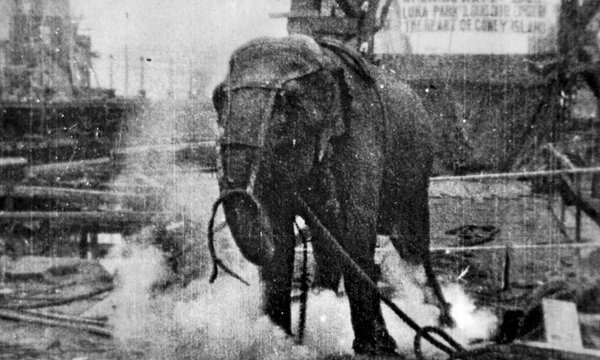Topsy and Animal Biography

On January 4, 1903, an Asian elephant called Topsy was electrocuted to death on Coney Island, New York. One hundred and fifteen years later, I remember Topsy in my chapter in the recently published Animal Biography: Re-framing Animal Lives edited Andre Krebber and Mieke Roscher and published by Palgrave in their series Studies in Animals and Literature.

Animal Biography: Re-framing animal lives edited by Andre Krebber and Mieke Roscher (Palgrave)
The anthology introduces animal biography as an approach to the re-framing of animals as both objects of knowledge as well as subjects of individual lives. Taking an interdisciplinary perspective and bringing together scholars from, among others, literary, historical and cultural studies, this volume seek to refine animal biography as a research method and framework to studying, capturing, representing and acknowledging animal others as individuals.
Topsy’s electrocution was filmed by the Edison Manufacturing Company. Electrocuting an Elephant is recognized as a key development in filmmaking history. It is thought to be among the first to film the death of an animal or a human. It’s been watched nearly 1 million times on YouTube. It took place at a time when the United States was emerging as an industrial world leader. Topsy’s electrocution was made possible by Thomas Edison. The celebrated inventor experimented with horses, dogs, and other animals by electrocuting them. He also fought the so-called War of Currents with George Westinghouse, which determined that the United States would use alternating current (AC) that Westinghouse wanted over Edison’s direct current (DC).
With the publication of my chapter in Animal Biography, my attention is now focussed on completing a book about Topsy. In writing Topsy’s biography I’m researching contemporary press reports and refering to recent scientific research into elephants and their behavior, communication, and psychology. I’m drawing from the emerging academic fields of animal law and animal studies in the social sciences and humanities. I will explain why Topsy, and many other elephants who go “rogue”, suffer from physical and psychological trauma. They don’t deserve to be killed because they’re “murderers”. Instead, they need our compassion and respect as traumatized individuals who require specialized care to rehabilitate them so that they can live out the rest of their lives safely in sanctuaries resembling as much as is possible their natural environment.











